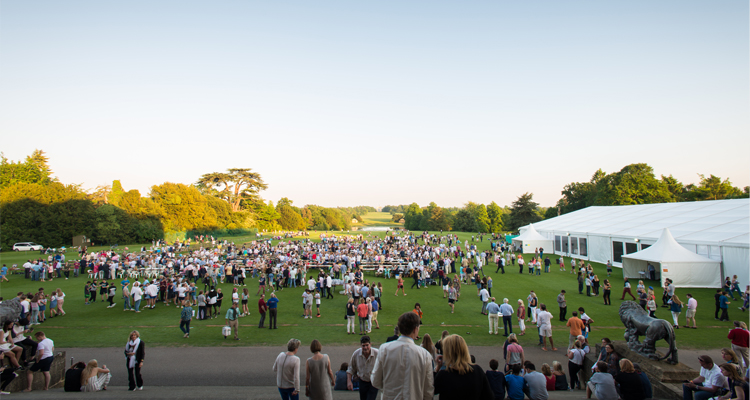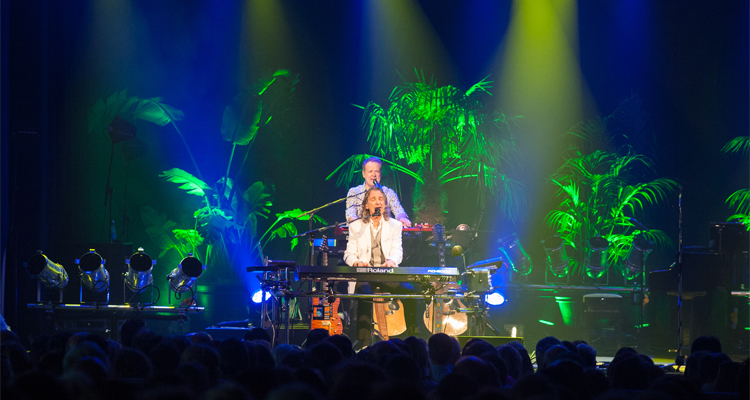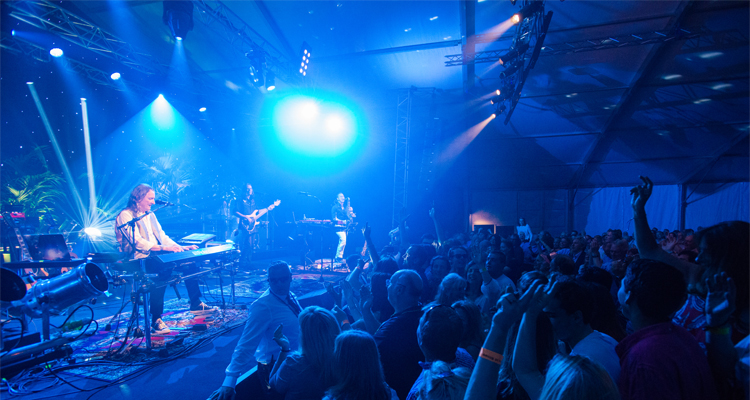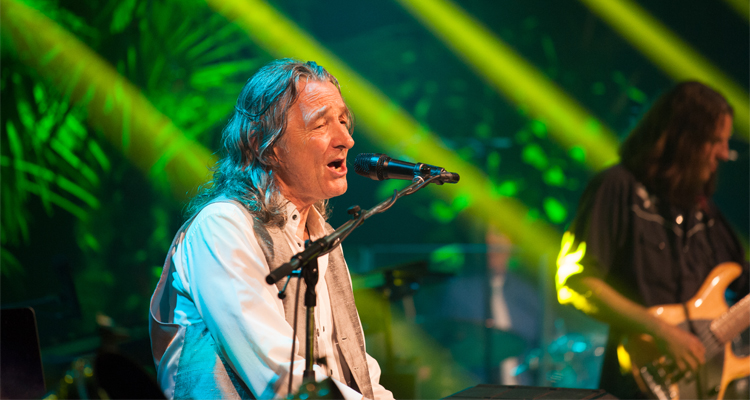On an early evening last May, with Stowe looking its very best as the sun was beginning to set on that most Elysian of landscapes – just the addition of the figures of Diana and Actaeon or Apollo and Mercury in the foreground needed to complete the Claude Lorrainean effect – some serious magic was about to happen.
On this perfect evening, nigh on 3,000 people were settling down to their picnics or VIP dinners prior to witnessing the return of one of Stowe’s own sons, Roger Hodgson (Grenville 68), showcasing his majestic oeuvre courtesy of Arts at Stowe and The Chance Organisation.
Inevitably, the start of this sort of event is always the graveyard slot for the first support act. Whilst everyone was having their dinner and consuming quantities of wine, B2 did their very best to engage the audience by performing an enjoyable and professional set to a sadly, virtually empty marquee.
When HUX, the second act of the evening, hit the stage, the audience had swelled to an acceptable size. They delivered an accomplished set showcasing songs from their forthcoming album. Now, whereas Hux usually perform as a two piece acoustic act, tonight they were augmented to great effect by the addition of bass and drums. However successful an acoustic act is, nothing compares with watching the interaction and camaraderie of a full band in action – and Hux personified this.
The contrasting dynamic of the two main protagonists, Patrick Keating (Bruce 15) and George Huxtable (Chatham 15), worked brilliantly. Both sharing the duties of vocals and guitar, the combination of this pair of such disparate performers gave strength and credence to an electric performance backed up by the bass and drums of Oscar Golding (of Ed Sheeran’s band) and Karl Brazil (of Robbie Williams’s, Ed Sheeran’s and James Blunt’s bands).
The summery warmth of Jack Johnson-like sounds being driven along by the tight funk of Jamiroquai-influenced rhythms created an intriguing and captivating mix, which was welcomed and appreciated by the audience wholeheartedly. There is talent of extraordinary stature emanating from these two Old Stoics.
The role of warm-up act to the main attraction is invariably a thankless task no matter who you are and, as good as they were, it has to be acknowledged that the majority of the audience had, after all, come to see Roger Hodgson – and boy, oh, boy, was he on fire! No holding back here. Whether giving us all that we wanted to hear from his most extensive back catalogue of Supertramp songs or introducing us to his later solo work, Roger gave a performance like it was his last and did the audience appreciate it? You bet they did!
All the Supertramp classics were there: Breakfast In America, Hide In Your Shell, Take The Long Way Home and all greeted with rapturous enthusiasm by the audience who then positively erupted at the opening bars of the Logical Song and the brilliant sax solo – is there a more infectious song than Dreamer? – Probably not! Roger’s lesser-known solo work was given forceful airing and there are some absolute gems amongst them, Death and The Zoo in particular, a poignant and thought provoking paean to the heartless, thoughtless and utterly pointless practice of keeping wild animals locked up in confined spaces for the simple amusement of mankind: heart-breaking stuff.
The staging and sound quality arranged by The Chance Organisation were excellent with wonderfully dramatic and effective lighting and a first class sound system which had, unfortunately, to battle furiously with the rising crescendo of chatter from the rear of the auditorium. This was due to the experimental reconfiguration of the seating arrangements from previous years, rendering the 50% of the audience furthest from the stage unable to see the performance properly thus preventing Roger to make any real connection with them. This was such a pity as the resulting cacophony was distracting and irritating for the rest of the audience and which, as the Headmaster so aptly and wittily put it, resulted in the band having to “crank up the volume to 11, like Spinal Tap!” Despite that, it was one helluva gig and an absolute triumph and the band, by all accounts, loved it too!
The repertoire was pretty much the same as he gave us during his previous concert at Stowe, which I reviewed in the 2014 edition of this magazine. I thought that rather than repeat myself with a re-hash of my previous review, it would be more fun to interview Roger to get an insight into the mind of such an illustrious songwriter. So, here we go:
Nigel Milne in Conversation with Roger Hodgson
NM – Well, Roger, from Head of Grenville House to conquering the world as the writer and performer of some of the most iconic songs of our generation, we can confidently say “The boy done good!” This is now your third performance at Stowe during the last ten years and so one can’t help feeling that you have a definite affinity with the place. I have always maintained that one never actually leaves Stowe and that spending five years of one’s life in such wonderful surroundings is bound to etch itself permanently onto one’s DNA. Can you tell us how your time at Stowe has influenced your subsequent life and what bearing it has had on your success?
RH – It is difficult to encapsulate all the feelings and memories that returning to Stowe bring up in me. It is cathartic, healing, inspiring. Yes, one never forgets five years at such a pivotal time of life living in a place like Stowe and,of course, it had a profound influence on me – and my song writing. Stowe has changed so much: the liberal forward-thinking Stowe of today is very different to the Stowe that I attended.
I was there from 1963 to 1968. While the 60s Cultural Revolution was raging outside, the culture of Stowe was hanging on desperately to what felt like Victorian traditions. While the Beatles and Stones were challenging the status quo, hair below the collar was strictly forbidden inside the School. Girls had not been assimilated into the School and corporal punishment was still the ultimate deterrent. While Stowe was undoubtedly beautiful, I don’t remember appreciating the beauty like I do now. Remember, Stowe back then was 600 boys, an all-male staff, in this ultra conservative surreal palace in the middle of nowhere, before the internet, before computers, before mobile ‘phones, before female compassion and sensitivities…it is hard to imagine now with what Stowe has become but back then it made for some pretty eclectic dysfunction. All of which I am very grateful for now because it spurred me on to the journey of healing and exploration and search for meaning that has dominated my life and, been represented in my music.
If it wasn’t for Stowe perhaps The Logical Song would never have been written – “then they sent me away…” Today, when I visit I can’t help but feel proud of what Stowe has become under Anthony’s direction. His passion and belief in giving young people a voice and opportunities for life, plus his love for the place is infectious and inspiring.
The audience of old and current Stoics at this last concert was among the most vocal and enthusiastic of the whole European tour. And I don’t think it was just the drink! One of my surprised band members asked me afterwards, “what kind of school is this?”.
NM – One quite often hears about successful people who cite a particular teacher as a major influence on their life and career. Can you single out any specific teacher at Stowe who has been a major force and inspiration to you in the development of your career?
RH – Mr James, my ever patient piano teacher who all but gave up trying to teach me to read music as I was more comfortable playing by ear.
NM – When we were contemporaries at Stowe and each had our own bands playing “covers” at school dances and concerts, punching out numbers by The Beatles, The Small Faces and The Who etc., who would you say were the main influences on you and when did you actually start writing and performing your own material?
RH – The Beatles, The Kinks, The Who, Traffic, Holst’s, The Planets…
NM – Is there a particular song by another artist that makes you think “RATS!!! – I wish I had written that!”
RH – No, but my favourite piece of music of all time is Debussy, Claire de Lune. Structurally, melodically, emotionally it’s a masterpiece.
NM – It must be a continual source of frustration for you to know that at most concerts all the audience wants to hear is the classic old stuff when you are itching to try out your new material on a live audience – or are you just philosophically grateful?
RH – I see my job as giving audiences the best experience they could have hoped for so obviously new songs can rarely compete with songs that have accompanied people through more than half their life, many of which have powerful memories attached to them. I weave in a new song or two, ones that I feel the audience will receive on first listen, but generally, I try to design a two-hour musical journey with a choice of songs crafted to the venue, the event, the country and the audience. I will change direction during the show if I feel it’s needed.
NM – Whilst being eternally grateful for the success of your SUPERTRAMP oeuvre in that the mortgage is paid off, your children have been educated and that it has given you the chance to pursue other projects, do you ever find yourself staring at the keyboard and thinking, “If I have to play Dreamer one more time I think I shall explode!”?
RH – The songs I’ve written seem to have an evergreen quality to them. Thank God, I rarely tire of singing them. Occasionally, I’ll give one a break for a few shows but it always feels good when I come back to it and play it again.
NM – The Old Stoic Society is developing a Mentoring Programme for Sixth Formers and recent school and university leavers. For the boys and girls who dream of a future in the Music Business as either a performer, writer, producer or in Management, would you please be very kind and offer some words of advice, help and encouragement?
RH – Follow your heart. Follow your passion. When I picked up my first guitar at age 12 that was it, from then on Music was all I wanted to do. At prep school, between classes, on breaks I’d run off to a quiet place to play my heart out and, very soon, I was writing my own songs. The beauty of youth is that things are still unformed. So follow your passion, whatever it is you dream of doing, pursue it by every means possible. I believe life responds to passion, determination, intention, decision, not giving up. Yes, life will test you, perhaps make you pay some dues, see how badly you want it. Very few get it handed to them, and if they do, I don’t actually believe they’re the lucky ones. Knock on doors. If you have a hero, someone you admire, go meet them, ask them for advice, even ask to be an intern, for free…..think outside the box. I was taught our thoughts create our reality. Absolutely focus on what you want and believe you can manifest it.
NM – There must be many obstacles to overcome and traps to avoid especially within the business side of the Music Industry. One is always hearing stories of how trusting and unsuspecting musicians have been seriously ripped off by unscrupulous managers and accountants. How would you advise today’s youngsters to avoid this and how can they possibly know whom to trust?
RH – Discernment is something often learned from experience, sometimes painful. Nowadays, it is not just the music business, every negotiation in life requires savviness and research to know if you’re getting a fair deal. Never sign a contract without having a lawyer look at it and develop your intuition, or gut. If it smells fishy then it probably is. Always sleep on it when making big decisions. Follow your heart, follow your intuition, hang onto people who have earned your trust. Maybe one of them is not a manager now but can learn. The music business is not rocket science.
In the past, record companies would give huge advances to bands to make albums. Supertramp albums cost a fortune to make so when it was finished we had to sell a million albums just to pay off the bill. Nowadays things are very different. With a computer, some instruments and some creativity, you can produce something of very good quality for very little expense. Making a video is also pretty simple, once you learn the program. There is Youtube and many other outlets to post the results on. Then you have something to bring people’s attention to, be it a club owner or an indie label or the general public. There’s no formula today, a close friend said it’s like the Wild West. Using imagination and persistence as well as belief can take you a long way.
NM – You, along with your peers, have had huge success (and deservedly so) brought about by the implementation of your talent, sheer hard graft and by ‘paying your dues’ on the way up. What is your opinion of the current batch of talent shows such as THE X-FACTOR, AMERICAN IDOL, THE VOICE and their offering of fast-track avenues to success?
RH – It is easy to criticise these types of shows but with the collapse of record companies, there are few avenues for young talent to get heard and find support. Artists historically have often relied on Patrons and that is what record companies used to be able to do. Nowadays you are as likely to get noticed by doing something innovative on Youtube.
NM – Several luminaries in the Rock’n’Roll Pantheon have, at certain times in their careers, gone completely off piste and produced classically inspired works. Paul McCartney with his Liverpool Oratorio and A Leaf, Jon Lord of Deep Purple with his Durham Concerto and his suite To Notice Such Things and Tony Banks of Genesis with his Six Pieces For Orchestra. Can we expect to be delighted by something symphonic from you at any time?
RH – I have many pieces, many songs, some finished, many needing me to complete the lyric, the last count was over sixty. I would love to at least document them and, perhaps, release some of them before my life journey ends but time is an elusive commodity nowadays.
NM – Finally, Roger, it is obvious that you love performing. So, now what is your plan? Will you decide one day that enough is enough and concentrate on ’tending your roses’ or will you continue to tour until one day your forehead hits the keyboard and you slide elegantly off your piano stool?
RH – Who knows what the future holds. I know the demand just keeps on increasing, which is wonderful, and it’s hard for me to say no. There is something very special happening with the personal and emotional content of the songs and people’s connection with them. The experience that people have from the concerts has many coming back time and again. I love people and obviously love playing music and it fulfils that place in me that wants to be of service.
In these accelerating stressful times, I know music and seeing musicians enjoy themselves can offer a reprieve from the daily and worldly challenges we are all facing. So to answer your question, I’ll keep going until I get a sign or my heart or body tells me it’s time to slow down or switch gears to something else. I’m amazed that this is my 14th straight year touring. I’m blessed to have been given a youthful healthy body but I know it’s one’s outlook on life that makes the biggest difference. If I had to encapsulate my secret recipe for life, it is to be grateful for everything – even the hard stuff, for that’s when you learn, grow the most, desire, pray and intend to be of service – to life, to your fellow man, to God. Give a little bit has some good tips in how to be happy.
NM – Roger, that was great. Your thoughtful insights and advice are fascinating and will be of invaluable interest and inspiration to many Stoics whose ambition is to emulate your enviable success. Thank you for taking time out from your peripatetic life to talk to me and give us Old Stoics a glimpse into the mind of a successful songwriter, musician and performer. We are glad and very proud that you are one of us.
Nigel Milne (Chandos 68)





